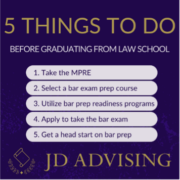Preparing for the MEE: How to Use your Time Efficiently
 Preparing for the MEE: How to Use your Time Efficiently
Preparing for the MEE: How to Use your Time Efficiently
If you are preparing for the MEE (Multistate Essay Exam), there are a few things you can do right off the bat to use your time efficiently. In this post, we tell you how to prepare for the MEE in an efficient manner that will ultimately save you time.
Preparing for the MEE: How to Use your Time Efficiently
Here, we list a few steps to ensuring you are preparing for the MEE in an efficient manner. Our goal is to teach you strategies that will maximize every hour you spend preparing for the MEE so that you can minimize any wasted time or unnecessary frustration. We want you to see quick improvement in your scores and to have confidence walking into the Multistate Essay Exam. For that to happen, follow these steps:
1. Figure out the basic structure of a Multistate Essay Exam answer.
While this may seem like an “obvious” step, it is often overlooked. A lot of students write law school essay answers to MEE questions! Bar exam essay answers are very different than law school answers. Unlike law school essay answers:
- there are less issues to discuss in a bar exam essay answer
- you are not expected to “argue both sides” in most bar exam essay answers
- bar exam essay answers generally have correct conclusions
- format (a clear use of “IRAC”) is very important in bar exam essay answers.
Bar exam essay answers can actually be easier to write than law school essay answers! You just have to make sure you are following the proper “formula.”
In your MEE answer, you should:
- Concisely identify the issue
- For each issue, state the rule clearly
- Apply the law to the facts (in general, you will not argue both sides–you will just apply the law)
- Conclude for each issue (there are usually correct conclusions–unlike law school essay answers!)
In other words, follow “IRAC” to a tee for each issue!
For more guidance, check out this post on how to structure a multistate essay exam answer.
2. Focus on the law that is most likely to appear on your exam.
Certain topics are much more likely to appear than others. It does not make sense to try to learn every area of law in the fourteen MEE subjects that could potentially be tested. Instead, you should focus on the MEE topics that are tested the most frequently. If you are looking for a free resource, check out our blog on the highly tested MEE topics here. (We have a free PDF and youtube video for download.)
We offer an MEE seminar that covers the most popular topics within each subject. The seminar contains highly tested information as well as our predictions for the upcoming MEE. You can also buy our MEE one-sheets, which give an overview of the highly tested topics for each MEE subject.
3. Make sure you have practice questions available.
Some courses do not provide MEE practice questions — or they only provide a few practice questions for each subject. It is much better to have numerous practice questions readily at your disposal. We have MEE books where you can purchase practice questions. You can also find some online (from 2008-2013) from the NCBE website.
We tell you more resources for finding past MEEs here.
The point of this step is you don’t want to waste a lot of time searching for practice answers. And you don’t want to be afraid to “use up” the ones you have. If you have plenty at your disposal, you will be more inclined to get started answering them!
4. Bullet point answers regularly.
Taking timed exams is critical. And writing full answers to MEE questions is important. However, to get exposed to the maximum amount of MEE essays, we recommend bullet pointing answers to MEE questions regularly. When you bullet point answers:
- use a heading for each issue
- state the material elements of the applicable rules
- jot down a few key facts you would analyze
- conclude for each issue
Then, check your answer against the Examiners Analysis using self-grading (discussed next!). Bullet pointing answers is especially good to do after you have a decent grasp of the MEE structure. It can save a lot of time. However, as the exam gets close, you should incorporate timed exams and write full answers to essay questions.
5. Don’t solely depend on an outside grader: learn how to self-grade your MEE answers.
While a bar review course or professor or friend may give you valuable information on how well you are writing MEE answers, we highly recommend self-grading MEE answers first and foremost. Self-grading MEE answers will put you in the mindset of a bar exam grader. It is the fastest way to see quick improvement in your MEE score. And it will help you feel more confident walking into the exam. Please read tips on how to self-grade your MEE answers here.
These tips should help you prepare for the MEE in an efficient and time-saving way. They will also help you maximize your score on the MEE portion of the bar exam. Good luck preparing for the MEE!
Seeking MEE Expertise?
🌟 Freebies & Discounts
- Free Bar Exam Resource Center: Explore for leading guides, articles, and webinars.
- Expert-Crafted Bar Exam Guides: Unveil insights on high-frequency MEE topics and strategies for success.
- Free Webinars: Engage with top bar exam experts.
🔥 Top-Rated MEE Resources
- MEE One-Sheets: Boost your confidence with our most popular bar exam product!
- Bar Exam Outlines: Our comprehensive and condensed bar exam outlines present key information in an organized, easy-to-digest layout.
- NEW MEE Mastery Class: Unearth focused, engaging reviews of essential MEE topics.
- Bar Exam Crash Course and Mini Outlines: Opt for a swift, comprehensive refresher.
- MEE Private Tutoring and feedback: Elevate your approach with tailored success strategies.
- MEE Course: Preview our acclaimed five-star program for unmatched instruction, outlines, and questions.
🔥 NEW! Dive deep into our Repeat Taker Bar Exam Course and discover our unrivaled Platinum Guarantee Pass Program.




Leave a Reply
Want to join the discussion?Feel free to contribute!